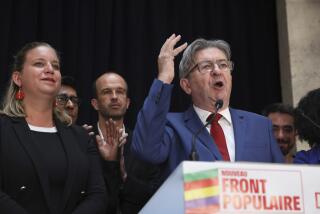Questions and answers about the Catalonia independence vote
- Share via
BARCELONA, Spain — Parties pushing for independence from Spain won a majority of seats in Catalonia’s regional Parliament in a ballot Sunday, but failed to secure more than 50 percent of the popular vote in an election they had hoped would give them a clear, unequivocal mandate for secession.
With 98 percent of the votes counted, the “Together for Yes” group of secessionist parties had 62 seats in the 135-member parliament, meaning they would need to join forces with the radical Popular Unity Candidacy party — that secured 10 seats — to be able to push regional legislation through.
However, together they only won 47.9 percent of the popular vote, meaning opponents to independence were in a majority.
Here are some questions and answers about the Catalonia independence vote:
Q: How and why did the vote come about?
A: Catalonia is a prosperous, industrialized region in northeast Spain sharing a Mediterranean border with France. It has for centuries treasured its own language and culture, but during the 1939-1975 military dictatorship of Gen. Francisco Franco, the Catalan language was banned in spoken and written forms.
The recent surge in independence sentiment stems from June 2010, when Spain’s highest court struck down key parts of a groundbreaking charter that would have granted Catalonia more autonomy and recognized it as a nation within Spain.
Artur Mas, Catalonia’s regional leader, began openly pushing for an independence referendum but Spain’s central government has repeatedly quashed moves for a plebiscite, maintaining it would be unconstitutional.
Eventually, Mas decided to turn elections for the regional parliament into a substitute ballot on independence.
Q:
A: Mas has claimed victory as separatists had a majority of lawmakers returned to parliament in Barcelona. However, opponents to independence say the majority of votes were cast by those did not want to break away from Spain.
Q: What does Spain’s government think?
A: The government of Prime Minister Mariano Rajoy has made it clear it will use all legal methods to prevent the independence of Catalonia, which accounts for nearly a fifth of Spain’s economic output.
Q:
A: With both sides claiming some form of victory, moves to declare independence will be opposed. Months of negotiations are likely.
Many analysts believe the independence drive will be halted after Spain holds a general election in December and decides whether Rajoy and his Popular Party stay in power. Whoever wins, analysts say, the next government is likely to start negotiating more autonomy and fiscal powers for Catalonia.
Copyright 2015 The Associated Press. All rights reserved. This material may not be published, broadcast, rewritten or redistributed.
More to Read
Sign up for Essential California
The most important California stories and recommendations in your inbox every morning.
You may occasionally receive promotional content from the Los Angeles Times.










